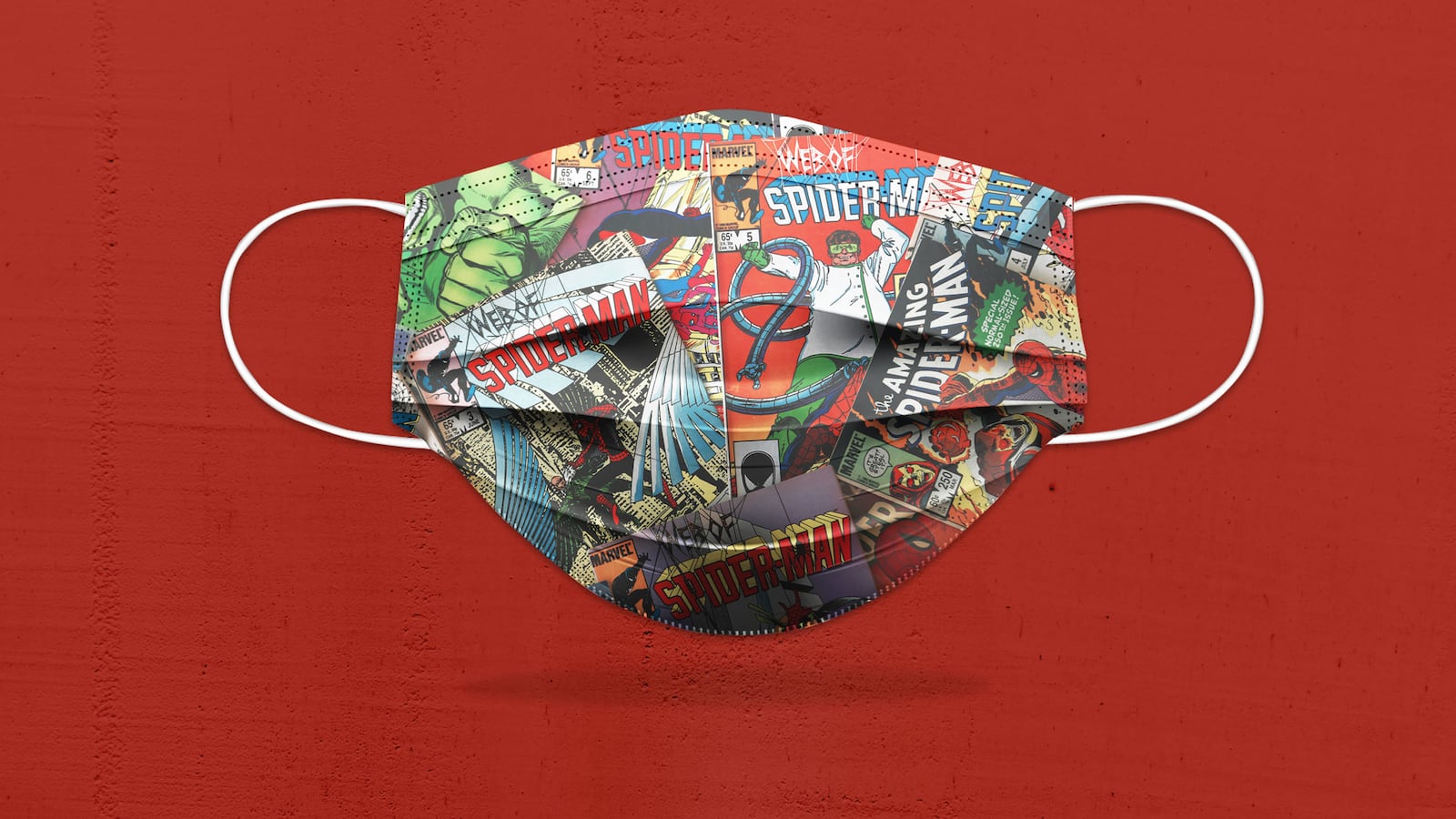World War II couldn’t do it. An industry crash in the 1990s couldn’t do it. Now, for the first time in the history of the medium, monthly comics are grinding to a halt due to the novel coronavirus pandemic.
Comics are largely sold through the direct market, moving from publisher to distributor to specialty comics retailers, as opposed to digital distribution or the newstands of yesteryear. But last month, Diamond Comics Distributors—the monopoly that supplies monthly comics to retailers in the United States and Britain—announced that it was refusing to accept new product from comics’ largest publishers, including Marvel, DC, Image, and Boom Studios. “Product distributed by Diamond and slated for an on-sale date of April 1st or later will not be shipped to retailers until further notice,” Diamond chairman and CEO Steve Geppi said in a statement.
“Our freight networks are feeling the strain and are already experiencing delays, while our distribution centers in New York, California, and Pennsylvania were all closed late last week,” Geppi’s statement continued. “Our own home office in Maryland instituted a work from home policy, and experts say that we can expect further closures. Therefore, my only logical conclusion is to cease the distribution of new weekly product until there is greater clarity on the progress made toward stemming the spread of this disease.”
Now local comic book shops and independent publishers face an unprecedented existential threat. Diamond’s announcement—which came partially as a result of the shutdown of Canada’s Transcontinental Printers, which handles orders from Marvel and DC—is the latest bout of confusion to hit the industry amid the pandemic. Many comics shops have been forced to temporarily close their doors to comply with shelter-in-place decrees, shifting where possible to online orders and curbside pickup. Free Comic Book Day, an annual May event designed to drive foot-traffic to realtors, was postponed on March 18th. Publishers like Image Comics announced that they were making new comics returnable, rather than forcing retailers to eat any overstock; Marvel offered a discount. Now, as a direct result of the suspension, IDW Publishing, which publishes licensed comics like Transformers, is suspending all of its May releases, and will reduce its overall publishing line through July.
“Trimming our line through the summer in support of the Direct Market retailers will undoubtedly impact creative workflow for the short term,” IDW’s president, Chris Ryall, said in a statement. “We fully appreciate the difficulty that this presents to freelancers. It’s our expectation that—in the long term—the Direct Market will bounce back as a result of these steps, and we can all continue the good work of making quality comics on the other side.”
Companies like DC Comics, meanwhile, apparently plan to power through. While Diamond has exclusive distribution rights to physical issues of DC and Marvel comics, DC has announced plans to pursue a “multi-distributor model to provide us with the flexibility needed during this crisis.” Since DC’s printer is shut down due to the epidemic, that would seemingly necessitate new printers and new distributors for single issues. (DC did not return requests for comment by The Daily Beast.) Initially, DC indicated that they were moving forward with digital publishing plans, despite retailer fears that digital releases through platforms like Comixology could potentially cut them out of the market. Later, the company back-tracked and removed shipping dates from new issues of comics like Batman on Comixology. (The company will still be releasing digital editions of trade paperbacks, reprints, and previously-announced digital-first exclusives.) Marvel Comics also announced on Tuesday that it would not be releasing digital comics, but alluded to finding alternate distribution or resuming digital distribution in the future.
DC’s abortive move toward digital distribution had infuriated comics retailers like Brian Hibbs, owner of San Francisco-based store Comix Experience, and writer of Tilting at Windmills, an industry column. Writing in a public Facebook post, he blasted the company for “encouraging retailers to violate stay-at-home orders and risk their health for corporate profits,” and called the company’s move toward digital “a dire mistake...I have never been more been more emphatically disheartened and disappointed by a so-called ‘partner.’”
The feelings of betrayal are notable partly because corporate comics is an exceedingly small world, built around the relationships between direct market retailers and a handful of publishing companies. Somewhat ironically, the industry’s reliance on the Diamond Distribution monopoly is itself—as comics reporter Graeme McMillen writes over at The Hollywood Reporter—largely corporate superhero comics’ fault.
In 1994, amid a massive industry boom driven largely by collector speculation, Marvel purchased Heroes World, then the third-largest comics distributor in the country, with the aim of making it their exclusive distribution channel. The move caused nearly every other comics company to sign exclusive contracts with Diamond, effectively undercutting other distributors. The finishing blow came during the 1990s industry collapse, when most distributors stopped being able to pay publishers as the comics shops they supplied went under. Heroes World, unable to effectively handle shipping logistics, went out of business when Marvel declared bankruptcy in 1997, leaving Diamond the sole distributor remaining in the wreckage of a drastically shrunken industry.
The direct market, which was in many ways buoyed by the 1990s, has also never really recovered from them. Local comics shops are in a particularly fraught position because—as with a lot of specialty retailers—the margins are razor thin, and serialized comics are, despite the success of their film adaptations, a niche interest. While stores are able to stock graphic novels and trade paperbacks through booksellers, the weekly influx of customers every Wednesday, when new comics are released remains a cornerstone of the direct market. “The fear is that the majority of comic shops are under-capitalized,” Hibbs told The Daily Beast. “Probably the overwhelming majority of comic shops are owned by guys like me, who are 50 or older. If someone doesn’t step up—whether that’s distributors and publishers or creators and fans—I think your average typical comic shop is not sure how they’re gonna survive.”
The best move for comics fans, Hibbs said, is to contact and support their local stores. “Tell them the comics you want in the future. Preorder comics from your local store. And check with your local store to see if they’re running a mail order so you can buy graphic novels from home.”
“Ultimately, this pandemic has revealed a lot of the weak infrastructure holding up this country, and the comic business is no exception,” said Tim Seeley, writer of comics Hack/Slash, DC’s Nightwing, and artist on multiple G.I Joe comics. “Having just one distributor for all stores, stores having to exist on thin margins, and over-reliance on just a few publishers and high-priced variant covers are all factors now coming back to bite everyone in the butt.”
The hits keep coming: Diamond announced that they are putting a hold on previously-scheduled payments to comics companies and toy merchandisers, due to “no longer receiving consistent payment from our customers,” i.e comics retailers, mail-order services, bookstores, and other outlets. (As in the 1990s, the move is likely to be a major blow to independent comics publishers.)
As this article went to press, comic store software management company ComicHub tried to roll out a tool that would have allowed customers to pay and pre-order comic books from their local store, read them digitally on the ComicHub app, and then receive them later in print. Opinions were split as to whether this constituted a reasonable way forward for stores and creators, a corporate fig leaf for the feared transition to digital, or whether the plan was even going to logistically work. Michael Doran at Newsarama laid out the questions: If retailers and/or publishers “owed” customers months worth of comic books when printing and distribution resumed, how would all those earmarked comic books be delivered without interrupting the flow of brand-new comics? What about customers who purchased from retailers that later went bust?
Just two days after the announcement, the ComicHub team pulled the plug on the project. “The ComicHub advance digital reader copy initiative isn’t going to move forward right now,” John Hendrick of Big Bang Comics told Newsarama. “Unfortunately publishers who were interested in joining the platform now aren’t and we can 100% understand their decision despite the positive reception by customers and creators. This might not have been a long-term solution but we didn’t need it to be one. We just needed it to tide us over until the industry returns to normal. Whenever that is but hopefully soon.”
For now, the arguments roil on, the flow of new monthly comics has ground to a halt, and there’s no clear end in sight. Chaos reigns.


